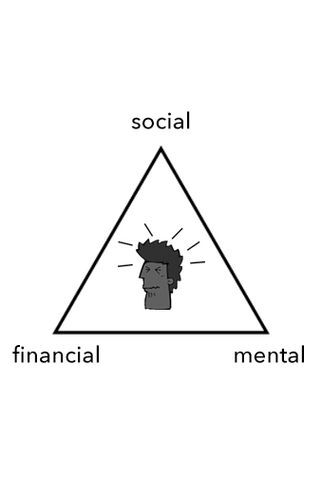Homework. Relationships. Clubs. A part-time job. Student loans. Planning for the future. These things and more race through the average college student’s head. Learning how to become an adult, away from home, is no small task, especially in today’s world. For many students, navigating their new lives can become a burden on their mental health.
The average age for mental illness onset is the early- to mid-20s, which is right around many students’ years in college. To address this, some students visit their school’s counseling centers. In a poll conducted by the Association for University and College Counseling Center Directors, 72 percent of students who sought counseling said that it had a positive effect on their academic performance. Additionally, the rate at which students are requesting to see counselors is going up.
With roughly 38,000 students, it would benefit Texas State if it had a larger counseling center. The Counseling Center is located on the top floor of the LBJ Student Center and houses 15 professional counselors and psychologists, as well as three post-doctorate residents and two doctoral interns, all of whom are qualified to provide counseling services for students. Individual sessions are roughly 45-50 minutes in length, while group sessions can be longer. However, due to the sheer number of students requesting to meet with a counselor, students cannot attend more than 15 sessions during their entire enrollment at Texas State.
This could pose a problem to students who require more than that. A student may need counseling for a period of time during their freshman year, then again their junior or senior year. Over time, their sessions add up and they find that they can no longer receive counseling in their later years, possibly when they need it the most.
When students reach their session limit, they are then given access to resources off-campus, but these have to be paid for by the student. This is where it can become a struggle for Bobcats who can hardly find enough money for food, much less counseling.
Ideally, more students would have access to more counseling at Texas State, but the session limit is a barrier to this. Perhaps the answer lies in growing the staff of the Counseling Center. The International Association of Counseling Services recommends one counselor for every 1500 students. Currently—including practicum trainees and one position listed as “TBD”—Texas State just barely misses the mark with this proportional allotment. Adding more counselors—even just one or two more—could assist in handling the large number of students requesting sessions.
This is easier said than done, as new professional hires will cost money. As of right now, funding for the Counseling Center comes, at least in part, from a fee called the Student Service Fee, which students pay each semester. The fee is $10 per credit hour that the student takes, but is capped at $90. If this cap was eliminated, the average student would pay roughly $60 more per semester. This increase in funds would go towards the Counseling Center, among other things. A single session at a private counseling center can exceed this tuition increase, even with insurance.
The 15-session limit should be discussed and, with changes, removed. Students receiving the treatment they need is only beneficial, especially when funded by the tuition they pay. With classes, money and the future weighing on Texas State Bobcats, access to mental health treatment should be a great priority for the university.
– Max Foster is an English sophomore
Categories:
A more accommodating counseling center is beneficial to every student
October 30, 2018

With classes, money and the future weighing on Texas State Bobcats, access to mental health treatment should be a great priority for the university.
Illustration by Cameron Hubbard
0
Donate to The University Star
Your donation will support the student journalists of Texas State University. Your contribution will allow us to purchase equipment and cover our annual website hosting costs.
More to Discover





